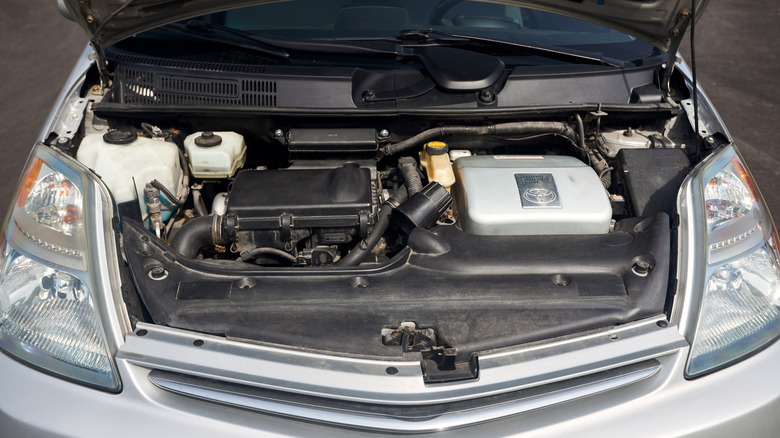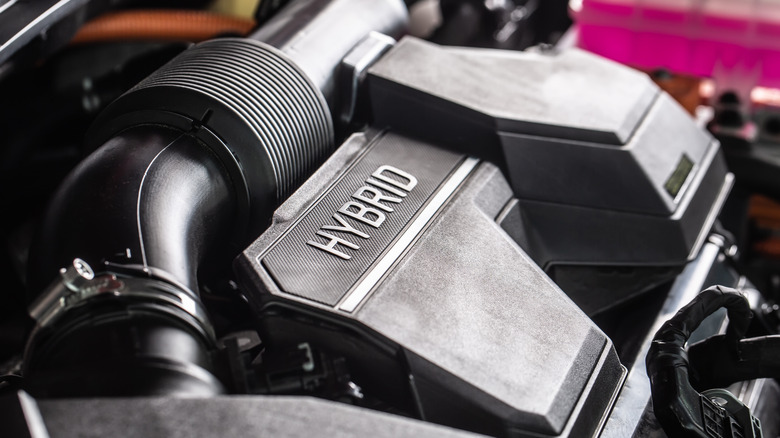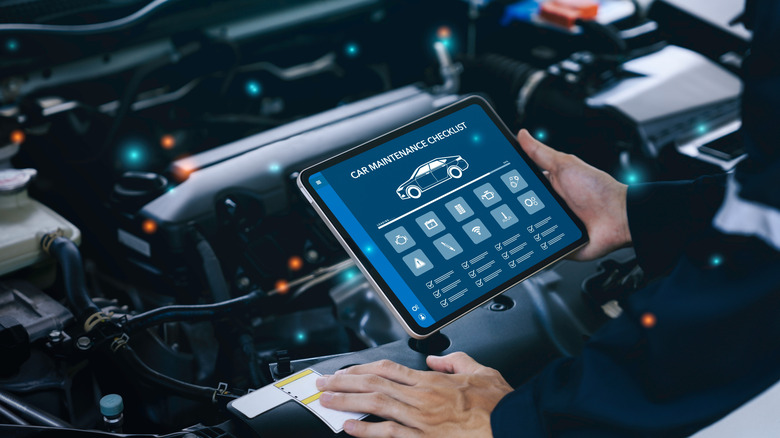Buying An Older Prius? Here's How To Spot A Healthy Battery
Buying a used Toyota Prius can be a smart investment for anyone who wishes to save on fuel costs while reducing their environmental footprint. Hybrids have now become a common sight on the road, and with the Prius debuting over two decades ago in the U.S., there are lots of used options on the market. The Prius is among the top most reliable used cars under $15,000, making it a desirable option for anyone who is looking for a dependable daily driver. Once you get past picking the ideal Prius years to buy, you should look into the linchpin of its reliability, the battery.
A healthy hybrid battery keeps the car running smoothly and maintains the efficiency and reliability that a Prius is known for. But, if the battery is on its last legs, you could face costly repairs that outweigh the car's savings. The health of a Toyota Prius' hybrid battery impacts the car's performance and longevity and should be a major consideration for anyone wanting to buy a used model.
Also, hybrid batteries operate at high voltages, typically around 300 volts, and can be extremely dangerous, even fatal if mishandled. Even the professionals take great care when diagnosing them. Before you make the purchase, it's important to spot a healthy battery, and it all starts with knowing the signs to look for and then seeking professional diagnostics.
Common signs of a deteriorating hybrid battery
Decreased fuel efficiency is often the first sign of a struggling hybrid battery. A failing hybrid battery typically loses its ability to hold a charge, and a car will increasingly rely on the gasoline engine, which leads to higher fuel consumption. You might also notice a reduced acceleration power as the hybrid system fails to deliver enough power to the electric motor. This makes the car feel sluggish, especially on highways or during takeoffs.
Another indicator of a failing hybrid battery is an irregular battery charge behavior. Normally, a healthy battery maintains a stable charging and discharging pattern. However, if the charging state fluctuates or the battery fails to reach full capacity while driving, the battery might have deteriorated. If the hybrid system detects a compromised battery, the vehicle defaults to the internal combustion engine, which will undermine the same reasons why the Prius is a big deal: performance and efficiency. If you see an illuminated light for the check engine signal, vehicle stability control (VSC), or the red triangle, then your battery might need replacing. Sounds like buzzing, whining, or clicking from the battery compartment often indicate trouble.
How to assess a Prius battery's health
One of the most reliable ways to check the hybrid battery's condition is by scheduling a pre-purchase inspection with a technician, preferably one who specializes in electric vehicles. These professionals conduct diagnostic tests, which involve evaluating output voltage, checking for faults, and measuring the battery capacity. Several automotive diagnostic apps give you access to your car's vital information. One diagnostics tool that will save you lots of money and is easy to use to assess the Prius battery is an OBD2 scanner, which also works on a wide range of cars. It allows you to monitor the battery's state of health, and the car's fuel consumption, and conduct a full battery test.
Another easy way to monitor battery health is through a scan tool, which connects to the car's onboard diagnostic system to provide real-time data on your car's fuel economy, cost per mile, and more. In a hybrid car, the scan tool can read codes linked to the hybrid battery and can perform tests like reset, battery discharge, and balance. Other good monitoring tools include a multimeter, which measures the electrical properties of a circuit, and a load tester, which assesses data such as voltage drop and capacity.
While Prius batteries can last between eight and 10 years or 100,000 and 150,000 miles, regular use can extend their lifespan. However, the age of the battery is a big factor. If the car is nearing the 10-year mark, make sure to budget for potential replacement costs.


